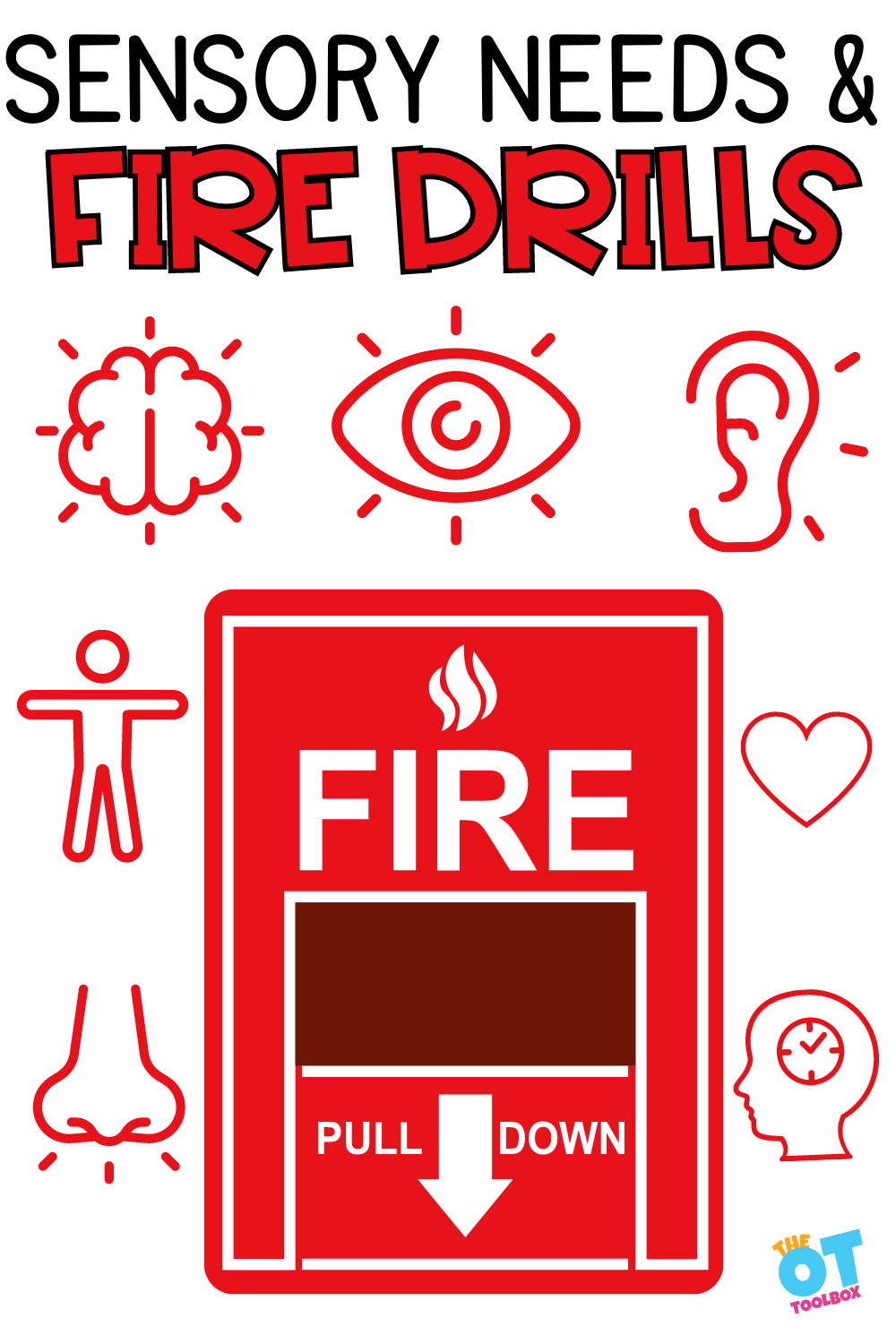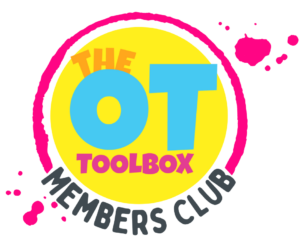Have you ever thought about running a camp program as part of your therapy offerings? Maybe you work at an outpatient therapy clinic and are looking for summer camps to offer to kids for a cash-based service. Perhaps you are looking for themed ideas to add to summer therapy sessions. Maybe you want to offer a therapeutic summer program that hits on specific skill areas. Or, maybe you are wondering how to set up a DIY backyard summer camp for your kids. A therapy camp may be just the way to build skills in a fun way this summer.
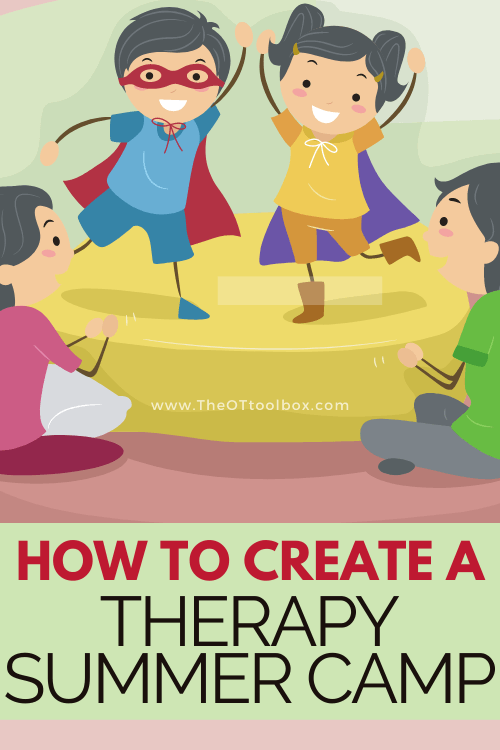
Setting up a space camp, handwriting camp, or sensory camp as a supplemental activity resource is easy and requires just a little planning. In this post, we’ll discuss how to set up a camp program as a side income, a supplemental service to therapy clinics, a summer therapeutic camp, or DIY home program.
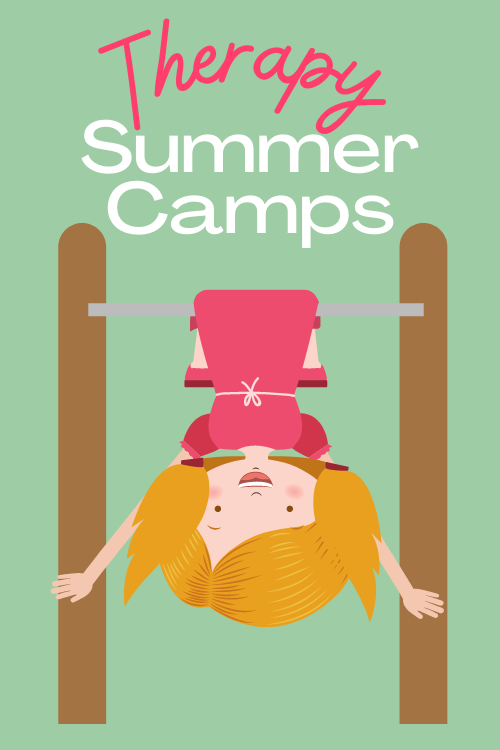
How to start a therapy Summer Camp
The steps below will help you decide how to run a summer camp at home or as a therapy camp that supplements summer programming.
The first thing to consider (prior to deciding on a theme or goals of the summer camp) is to determine the scope of your therapy camp. Is it a suppliment to therapy where therapy goals will be addressed generally across a group of kids? Will insurance need to be involved? Will you be using your therapy license to make clinical decisions? Or, will the summer program be a supplement to therapy where goals are not specific to each child and each child moves through the same set of activities without individualized adjustments? Will the camp be a cash-based activity type of program, designed to prevent summer slide in handwriting or pencil grasp skills? Or will the summer camp act as a developmental play sessions? All of these are important to questions to consider before making other decisions on the program.
Decide on the summer camp theme
First, you’ll want to decide on the theme of your summer camp. Will your theme be based on an interest area? Some ideas include pirate theme, outer space theme, water theme, sports theme, fairies theme, and more. The options are truly limitless when if comes to a summer camp theme. The best thing about a themed summer camp program is that kids are typically highly motivated if the theme interests them.
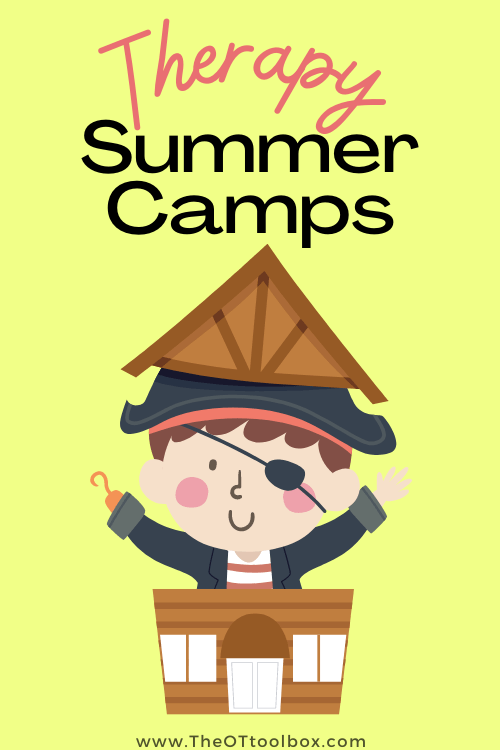
Summer camp theme ideas
Summer camp theme ideas can be as specific or general as you like.
Summer camp themes can be based on skills: fine motor, gross motor, handwriting, cursive writing, executive functioning skills, cursive writing, shoe tying, etc.
Summer camps can also be based on the activities that will be done: play dough, science experiments, gardening, cooking, dancing, acting, writing, or messy sensory play.
Or, the summer camp theme ideas can be based on a general theme like princesses, pirates, fairies, pretend play, cooking, nature, hiking, obstacle courses, camping, or anything! There are so many ways to incorporate interests and meaningful, motivating themes into a summer camp theme.
You can find lots of weekly theme ideas here. These are tailored toward using a set theme in occupational therapy sessions, but are designed to be open-ended so that they can be adjusted to meet a variety of needs and skill levels like in a typical therapy caseload. The thing about a summer camp program is that the activities are not therapeutic or individual in nature. Rather, they are a set of specific activities and so the weekly themes you find in this resource will be quite helpful in planning themed activities.
When I ran a cash-based program, the first thing that I decided on was the theme. We had a 4 week session with one class each week. The theme of the entire program was a Dig into Spring! theme. By deciding to first cover the overall theme of spring, I was able to come up with specific activities designed on the various skills being covered in the camp program.
Decide on the Skills being addressed in the therapy camp
Next, decide on the specific skills you are targeting. With a therapy camp, you likely won’t address specific goals. Rather, all of the participants will go through the activities as a supplement to build strength, sensory participation, or practice functional tasks. Are you going to cover sensory participation? Handwriting? Motor skills? Learning? Executive functioning skills? There are limitless options when it comes to skills being covered in a summer camp program.
Make these skills as specific or general as you like. You’ll also need to consider the age of the child and general child development.
Back to my Dig into Spring! camp…After deciding on the theme, coming up with the skills was next. I knew I wanted play and sensory activities to be predominant. Sensory based play is not an easy home program for some families to set up for children. Between the mess and the materials needed for sensory experiences, it can be hard to set up many activities that are so needed and powerful tools for building other underlying areas of development. I took the overarching skills of sensory participation and added fine motor work, core motor strength, balance, coordination, and handwriting.
The nice thing about planning your own backyard summer camp (or summer camp program at a therapy site), is that you can tailor the activities to meet the needs of the kids you serve. An outpatient setting may want to set up a handwriting camp that gets children involved in fine motor strengthening activities with a mix of handwriting. Another group may include executive functioning tasks for high school aged students. Whether you want to highlight fine motor skills, sensory activities, or executive functioning, the sky is the limit when it comes to a diy summer camp.
In a summer camp for kids, all of the children will participate in the activities at the same level. There won’t be specific goals being covered or adaptations or modifications. Now, if a child has a therapist or a support person that is involved in the activities who is able to modify the specific tasks and perform them as part of a therapy goal session, that is a different topic. For the discussion here, we are just covering the set-up of a therapy supplemental program or play group.
If you are setting up a camp as part of an adjunct to a clinic or a therapeutic summer camp program, there may be additional liabilities, payment or insurance considerations, and goals that need to be established.
Therapy Camp LOGistics
Next, decide on programming. How would you like to run this camp? Is it going to be one activity per day? For a backyard camp, keeping things open-ended at first can be beneficial for the whole family. Decide on one activity to address each day. For a more organized camp such as those being held in a therapy setting, perhaps you have a list of activities to run through each session.
Some tips include:
Have more activities available.
If children work through the activities quickly, you will want to have other ideas available.
Have extra “busy time” camp ideas ready.
For the students that arrive early or leave a little later than other students, you can set them up with extra activities.
Decide how you will set up the various activities.
Will the whole group work through the activities together in a centers type of set up? Will you break the group up into smaller groups? Will kids rotate through the centers a different times? All of this depends on the number of participants in the group as well as the help that you have available.
Will parents remain with children during the camp or will they drop off the students?
Be prepared with background information.
Be sure to get contact information and background information such as allergies, background information, and any other information needed.
Create a check-in/check-out system.
Create a system to allow for safe check-in/check out, especially if the camp set-up is drop-off style. Depending on the nature of the camp and location, this may require some extra thought and preparations.
Set up Summer camp disclaimers.
Be sure to indicate in several places that the activities completed in your summer camp will not be therapeutic in nature. If you are a therapist, the activities will not be therapy! They are developmentally appropriate play-based activities that allow children to explore motor skills, sensory input, and are not a substitute for therapy. You may want to have this disclaimer in writing which parents of camp attendees agree to in writing.
Another important disclaimer to include is write out a form for parents to sign which indicates safety and liability issues. This is a form that you may want to have written up by a lawyer, specific to your state and your particular summer camp programming activities.
Establish social distancing or other safety measures.
Another consideration is regarding current situations in the way of health and safety. This consideration also requires forethought and planning depending on your situation and summer camp.
plan the summer camp activities
Now comes the fun part. Once you have a theme and skills decided on, you can begin to plan out your activities.
Gather your ideas and your programming. Do a search on The OT Toolbox to look for activities for various themes and skill areas. We’ve got a lot of ideas here, so there should be something for every topic and skill.
Finally, start filling in the programming with your activities. Summer camp activities may include a warm up activity, a gross motor activities, fine motor space activities, sensory activities, and more. Perhaps you a have a writing portion to incorporate handwriting in fun and “non-handwriting” way. Ask kids to check in or write their favorite thing you did that day as a way to incorporate writing without asking them to sit and actually practice written work.
One great tool to incorporate into any therapy camp is our Summer Sensory Stations. The printables can be used to support mindfulness, self-regulation, coping skills, motor coordination, and strengthening. But best of all, they are a great transition tool to use in therapy camp activities.
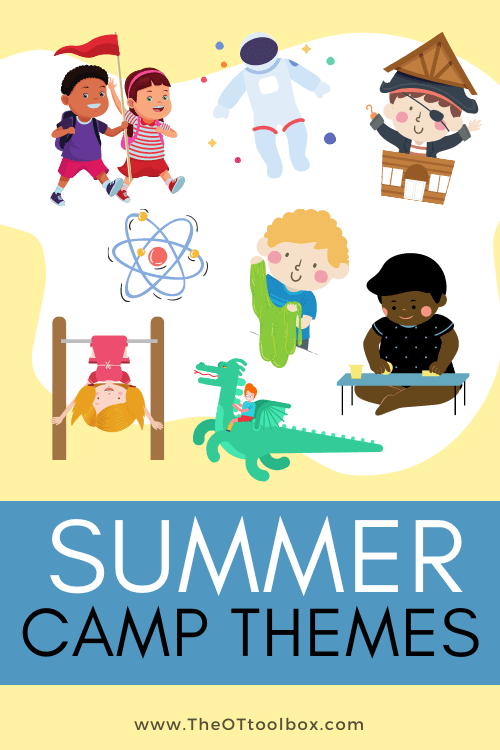
Summer camp ProGram Ideas
Sensory Summer Camp – Set up a backyard summer sensory camp that incorporates messy play experiences and motor skill development through play and interaction with friends.
Sensory Handwriting Summer Camp- Helping kids with handwriting? Use the ideas in this sensory handwriting camp to help with letter formation, sizing, spacing, and pencil grasp using sensory play-based activities.
Typing Camp- If you’re looking for an out-of-the-box idea for a summer camp program, how about a keyboarding club that helps kids improve typing skills, keyboard use, and typing speed?
Summer Cooking Camp– A cooking camp is a fun way to spend the summer cooking up recipes, creating summer memories, and helping with problem solving, creativity, executive functioning skills, and motor development. Try the recipes in our cooking with kids recipe collection (an A-Z Recipes collection)!
Cursive Writing Camp– Use the activities and ideas in this 31 days of cursive to teach cursive writing skills, letter formation.
Fine Motor Summer Camp– Work on fine motor skills through play. Set up activities with various materials each day of the summer camp:
- play dough activities
- playing cards activities
- craft pom pom activities
- paper clip activities
- clothes pin activities
Play Dough Summer Camp- How fun would it be to make play dough and explore textures, while strengthening fine motor skills? Try of the sensory dough recipes of our best homemade play dough recipes.
So, what summer camps are you thinking of?

